What Is the Difference Between Ethics and Law?

Ethics are moral values and standards that indicate to members of a society how they should act. Laws are rules and regulations that mandate certain behaviors and punish offenders who violate those regulations.
Ethics and laws set standards for how the members of a society should behave. Ethical codes tell people how to behave while laws enforce certain behavioral codes.
Ethical Behavior
Ethics are moral principles that guide peoples’ actions in their daily lives. Ethical standards influence the decisions that people make and why they make those decisions. Ethics, like laws, date back to ancient times. Over time, societies adopted ethical codes of living based on the influences of religion, philosophy and culture. Even within a society, people can disagree over morals. Some people, for instance, believe that the death penalty is a fair punishment for a crime, while others are opposed to it. Ethics fall into three categories: applied ethics, normative ethics and meta-ethics. Applied ethics are concerned with tangible, often controversial topics like warfare and birth control. Normative ethics apply to moral judgments, and they make distinctions between right and wrong behaviors. Meta-ethics consider the origin and meaning of ethical principles. The guiding philosophy behind ethics is a concern for others in a society with the ability of an individual to focus on the needs of others rather than his or her needs. People who behave ethically act in ways that have society’s best interests in mind.
Legal Standards
As with ethical codes, laws exist to control and regulate human behavior. However, unlike moral rules, broken laws are punishable through the court system. As a consequence of breaking a law, a person may be penalized with a fine, damage payment and/or imprisonment. Sometimes, people disagree over laws. Unlike ethics, where people simply discuss those differences and live with them, laws impose an official resolution. Laws have the enforcement capacity to maintain societal peace. The legal system breaks down into basic parts: public law and private law. Public law includes constitutional, criminal and administrative law. Laws in this domain deal with the relationship between an individual and the government. A criminal offense, for instance, is viewed as an individual taking wrongful action that threatens the health, safety and well-being of everyone in that society, even if the crime only involves one person. Private law deals with the relations between members of a society. This includes contracts, divorce and family issues, land ownership and more. Matters between the disputing individuals are private, and they do not involve consideration for the public’s good.
Laws and ethics both exist to improve citizens’ behavior; however, the standards are not always black and white. Sometimes, laws seemingly have good intentions, but can be viewed as unfair or unjust. It is also possible for a society to engage in ethically corrupt activities that are later viewed as harmful, such as tactics employed by the government in Nazi Germany. While not always fair or clear-cut, ethics and laws are in place to strive toward a peaceful and safe society for all members.





